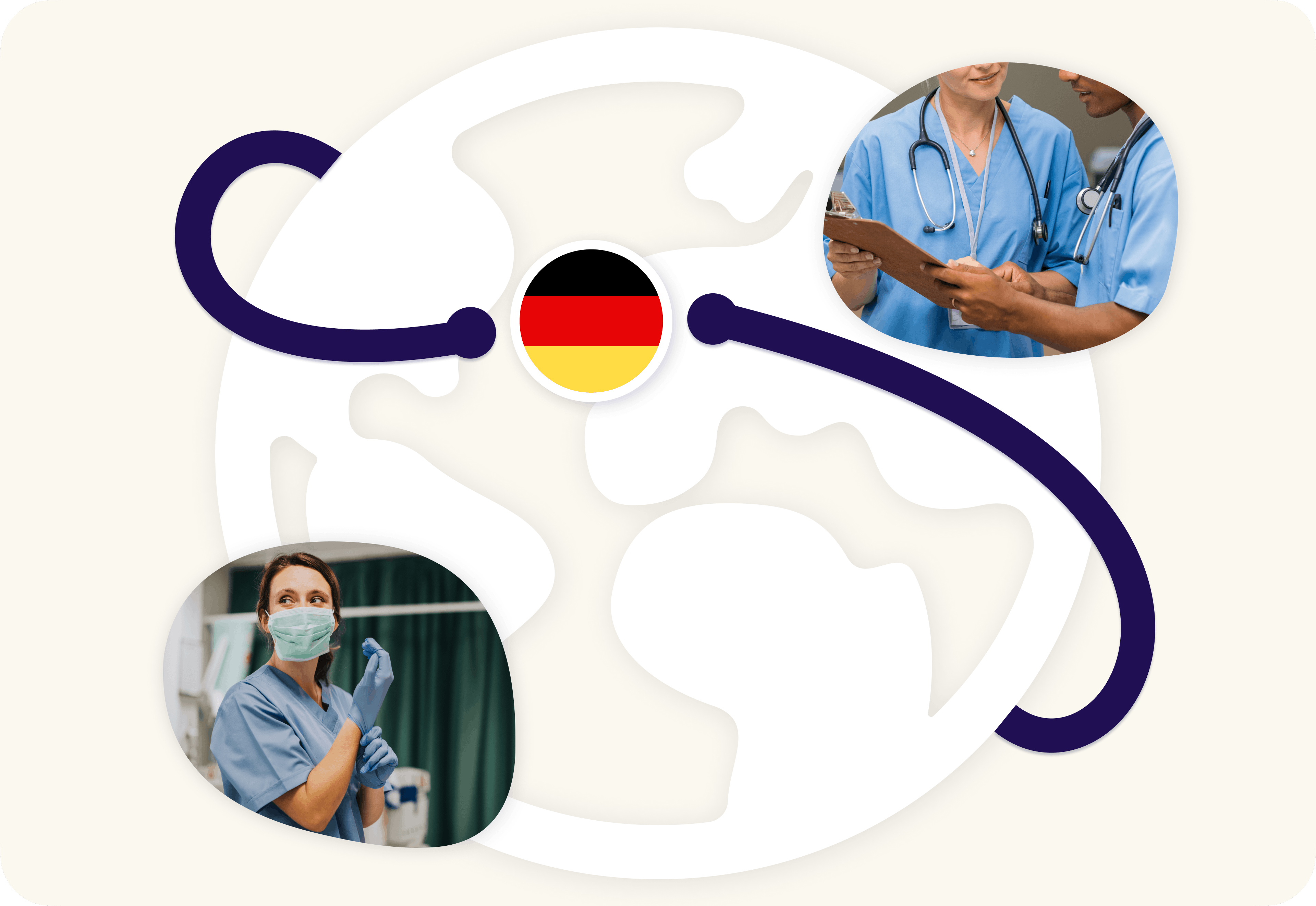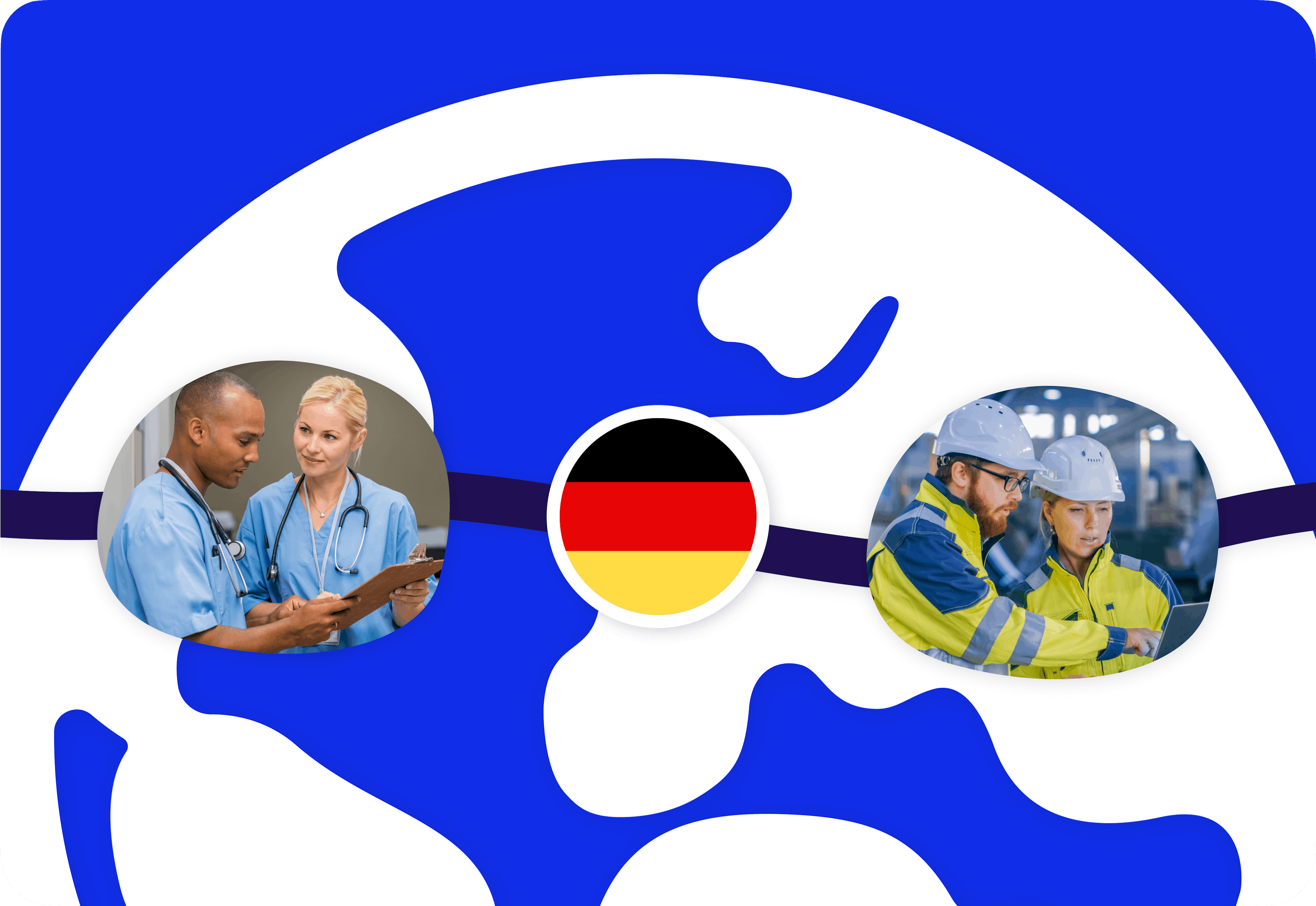The healthcare industry in Germany, like many countries, is increasingly looking to recruit skilled nursing professionals from abroad to meet the growing demand for qualified staff. For employers, understanding the visa and qualification recognition processes is crucial in successfully hiring and integrating these professionals.
Here’s a comprehensive guide to help you navigate the complex process of hiring foreign-trained nurses, including recognition of qualifications, visa requirements, and pathways for both skilled and assistant-level nursing staff.
1. Understanding Qualification Recognition for Nursing Professionals
Nursing staff from non-EU/EEA countries must undergo an individual recognition process, which assesses if their qualifications meet German standards for the nursing profession. If there are discrepancies between their training and German requirements, they may need to complete an “adjustment measure,” such as additional training or examinations, before being authorized to work.
Important Point: The recognition process is handled by the relevant authority in the federal state where the nurse intends to work. Once granted, this professional recognition is valid nationwide.
2. Meeting Requirements for Practicing Nursing in Germany
Germany regulates the nursing profession, and foreign-trained nurses must meet several prerequisites to practice. The primary requirements include:
- Professional Recognition: As noted, nursing talent must have their qualifications recognized. This can be done through either an equivalency assessment or by immediately opting to undertake a compensatory training or testing measure.
- Language Proficiency: Authorities require that talent has German language skills at the B2 level on the Common European Framework of Reference for Languages (CEFR).
- Medical Clearance: Nurses need to provide a medical certificate proving they are physically fit for the job. This can be obtained either in their home country or in Germany.
- Police Clearance: A certificate of good conduct, showing the talent’s trustworthiness, is also required. Talent can get the relevant documents from their home country or through the German police.
Approval from the Federal Employment Agency (BA): The BA must approve employment for nursing assistants, verifying that work conditions meet German standards. For candidates aged 45 or older, a minimum annual salary of €49,830 in 2024, or evidence of sufficient pension provisions, is required.
3. Visa and Residence Permit Process for Third-Country Nationals
Nurses from non-EU/EEA countries must have a residence permit to work in Germany. Which type of permit to pursue depends on the status of their qualification recognition.
- Work Visa for Fully Recognized Qualifications: If your talent’s qualifications are fully recognized and they have a job offer, they can apply for a work visa under Section 18a of the Residence Act.
- Visa for Recognition of Foreign Qualifications: If your talent receives only partial recognition of their qualifications, they may still enter Germany to complete the required adjustment measure. In this case, a visa is granted under Section 16d of the Residence Act, allowing talent to undertake additional training or examinations needed for full recognition.
- Accelerated Skilled Worker Process: You can expedite the immigration process by applying for the “accelerated skilled worker procedure” at your local immigration authority, streamlining the visa process for qualified nursing staff.
- New Opportunity with Recognition Partnerships: As of March 2024, a new amendment allows employers and skilled workers to initiate the recognition process directly in Germany under a “recognition partnership.” This can provide a faster, more collaborative pathway for skilled workers to begin their careers in Germany.
4. Ethical Recruitment and International Standards
Employers must also adhere to ethical recruitment standards. Notably, Germany abides by the World Health Organization (WHO) guidelines, which restrict the recruitment of healthcare workers from countries facing a healthcare personnel shortage. Employers should confirm with the Federal Employment Agency that their talent’s home country isn’t on the WHO-restricted list.
5. Funding and Integration Support for Employers
Employers investing in the long-term integration of foreign nurses can benefit from various funding opportunities:
- Language and Training Subsidies: Under the Care Support and Relief Act, employers can receive partial funding for B2 language courses and compensatory training measures. Additionally, the Qualification Opportunities Act allows wage subsidies for training periods when nurses are unable to work.
- Integration Tools: The German Competence Center for International Specialists in Health and Nursing provides a “Welcoming Culture & Integration” toolbox to help organizations create a supportive environment for new international hires.
Conclusion
Hiring foreign-trained nurses can be a complicated process, but with the right guidance, resources, and adherence to German requirements, it is possible to recruit and integrate skilled nursing staff from abroad.
By understanding qualification recognition, visa processes, and support options, employers can make informed decisions that benefit both their organization and the international nursing professionals they hire. At Localyze, we can help with the finer details and get your expat talent settled in their new location.



